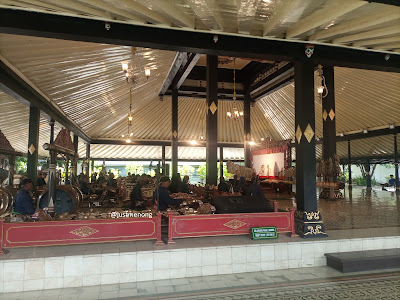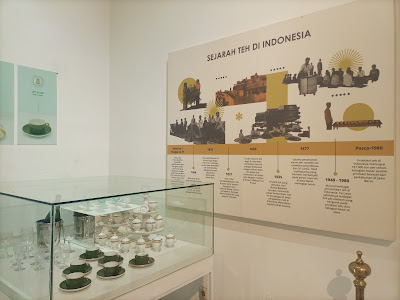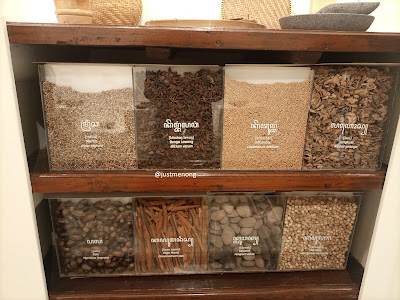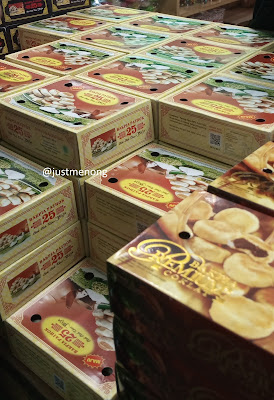Yogyakarta
always had a place in my heart and Zauji's. Even though we have visited
repeatedly, it feels like we never get tired of exploring tourist
attractions near Malioboro. Alhamdulillah, in this month of Shawwal we
had the opportunity to return to visit this city of struggle.
We
found a way to get around Yogya at an affordable price, which is by
riding Trans Yogya. Not only did we see the city of Yogyakarta from the top of
Trans Yogya, but we also took the opportunity to explore the tourist
attractions in Jogja near Malioboro onfoot.
We
stopped at the exact stop before the Beringharjo Market. After a little while, we finally stopped by the first destination, the Vredeburg
Fortress. This fort became the third stronghold that we have visited
before, after Rotterdam Fortress in Makassar, South Sulawesi, and Kuto
Besak Fortress.
After
being satisfied with going around in Fort Vredeburg, we stopped by the most
iconic tourist destinations in Yogyakarta. The one and only palace
of Yogyakarta.
Yogyakarta Palace
Who
does not know the palace of Yogyakarta? Zauji had been wanting to visit
the palace for a long time. Refrigerated from kratonjogja.id, the Sultanate of Ngayogyakarta Hadiningrat, commonly referred to as Yogyakarta, has been established since February 13, 1755, as a result of the Giyanti agreement
that broke the Kingdom of Mataram into two.
However,
the Yogyakarta Sultanate declared March 13, 1755, as the date of
proclamation. Yogyakarta Palace, or Kraton Ngayogyakarta Hadiningrat, as
the official palace itself began to be left on October 7, 1756.
Excluded
from culture.jogjakota.go.id, this palace has an area of 14,000 m²,
consisting of buildings where the sultan, family, and abdi dalem live. Yogyakarta Palace is declared a living monument area, which includes
the area of the Baluwarti (Njeron Fortress) and parts of Mantrijeron,
Mergangsan, Gondomanan, and Ngampilan. The Baluwarti area is combined
with the Malioboro area and used as a Kraton Cultural Reserve area that is
longitudinally from Tugu to Krapyak Stage.
We walked from the Vredeburg Fortress
that we visited earlier while enjoying the atmosphere of Yogyakarta in
the morning. It turns out that there are 4 destinations around the
Yogyakarta palace that we will go to. When we arrived at the first
ticket counter, officers informed us the front palace was in renovated
condition, so it was temporarily closed for a while. We were directed to
visit the other two locations nearby.
The
first location is the Yogyakarta Keraton Train Museum. It looks beautiful
and dazzling from the outside, but unfortunately, because of the limited
time, we agreed to choose Kedhaton as the next destination. Kedhaton, the
center of the Yogyakarta Palace area, is located behind the front
palace with an entrance ticket price of Rp. 15,000 per person.
Kedhaton Area
We
were welcomed to show the successful leather puppet making. Zauji moved
heavily because in the past the late father of Zauji was a fan of true leather
puppets. I just watched a leather puppet show in person. Many foreign
tourists also sit lined up to enjoy this show. And of course I don't
understand anything that is conveyed and occasionally ask Zauji to
translate it.
The
kedhaton area looks beautiful with the feel of a distinctive palace.
The soil is covered in sand so it looks unique. The courtiers greeted us
kindly. There is a written rule that visitors are prohibited from
taking pictures behind the courtiers.
Quoted
from kratonjogja.id, abdi dalem is a keraton civil apparatus that
serves as an operational implementer of the palace. Menong's friend can
recognize the servant by his typical clothes without footwear. At first I
thought a servant of the late was an old figure, but abdi dalem himself and many of the young people have a background of higher education,
cultural insight, and certain skills.
Gedong Patehan
We
enjoy the beautiful part of the palace and are stunned by the grandeur
as well as the simplicity that radiates from every corner. Some parts of the
palace seem to be touched by the modernization seen from the order of
the exhibition space we visited.
Menong's
friend can see him in Gedong Patehan, where the courtiers prepare
drinks for the sultan's family. On the front there is an explanation of
the history of tea in Indonesia and the explanation of patehan as a
landhosan show dalem (tradition of tea ceremony) to the tea table set
used in the palace banquet. I myself am amazed by this beauty that
brings together the power of the palace tradition with modern culture.
Every
day at 06.00 and 11.00 WIB, five people of the maidly dalem (abdi dalem
women) will walk in hand with a small hand to start the procession of
serving tea. Four people are tasked with carrying equipment consisting
of a set of rampans (tea supplies), a set of coffee rampads, one
teapot filled with hot water and one special teapot of water called a
cluccas. A fat water that had been left for one night. One person is in
charge of carrying songsong to protect the fat.
This
accomplishment starts from the building on the south side of Plataran
Kedhaton to Gedhong Prabayeksa. This presentation is done every day.
Drinks brought are stored to be taken back on the schedule of serving
the next drink.
the narrator narrator Exhibition
Next
we stopped by the Temporary Exhibition of Narawandira, an exhibition
held in the framework of Jumenengan Tingalan Dalem Hamengku Buwono X (a
series of ceremonies commemorating the ascension to the throne of the
king of Jogja, Sri Sultan Hamengku Buwono).
Organized
from March 5 to August 27, 2023, this exhibition raises the theme of
great vegetation, human relations, and nature conservation. Vegetation
itself means a collection of plants that grow together in a place to
form a whole unity. Menong's friends will be treated to a series of
galleries of how the Yogya culture grows to form a large and whole
unity.
At
first we passed this room because I thought this room was devoted to
certain guests only because it was so beautiful. But as it turns out,
this room is also open to public visitors. There are many rooms that
present different themes.
In
the first room, Menong’s friends were introduced to spices that are
commonly used for making out materials. There are recipes that
Menong's friends can use to treat some diseases, such as cough, fever, or
strong medicine.
The
next room features Yogyakarta's incredible philosophy, wealth, and
modern packaging. I myself am captivated by Yogyakarta with the balance
of nature and the universe that is maintained downhill.
And lastly, we enjoyed the beauty of the variety of bridal clothing typical of Yogyakarta palace.
Bakpia
This
is the typical Yogya souvenir that I like best. Although bakpia now has
many brands and flavors, the favorite bakpia still never changes,
namely the green bean and black kumbu brand Bakpia Pathok 25.
During
the previous visit, we stopped by the factory located at Jl. Karel
Sasuit Tubun No. 504, Sanggrahan, Ngampilan, Yogyakarta City. This time, we are looking for the nearest outlet as a tourist spot in Jogja near
Malioboro and the palace because they are tired of walking every day.
Thank
God we found an outlet not far from Kedhaton that can be reached on
foot. Not far from the Gede Kauman Mosque, precisely on Jl. Ngasem No.
8, we found an outlet that provides bakpia fresh from the oven so it tastes still hot and tasty. The price is the same as other places, which is Rp.30,000 per box.
Although
we had filled the stomach 30 minutes before, we were tempted by
meatball noodles located not far from the bakpia outlet, precisely at
the Ngasem-Kauman intersection. Because there are already many tourist
attractions in Jogja near Malioboro that we tried, we finally decided to
return to the homestay in Kaliurang to rest before returning to Bandung by train in the afternoon.
















Post a Comment
Post a Comment